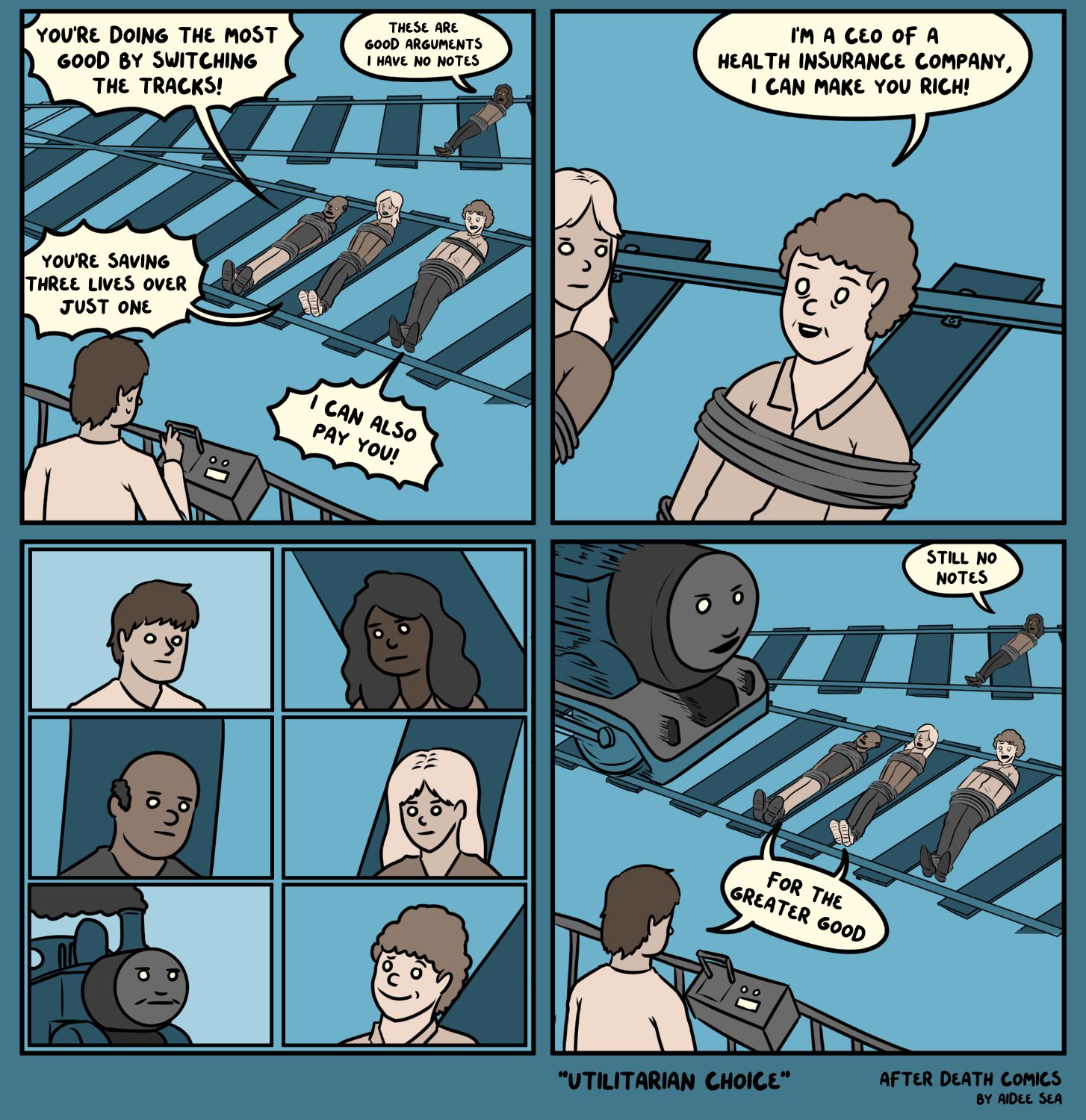this post was submitted on 09 Dec 2024
778 points (97.1% liked)
Comic Strips
13047 readers
2845 users here now
Comic Strips is a community for those who love comic stories.
The rules are simple:
- The post can be a single image, an image gallery, or a link to a specific comic hosted on another site (the author's website, for instance).
- The comic must be a complete story.
- If it is an external link, it must be to a specific story, not to the root of the site.
- You may post comics from others or your own.
- If you are posting a comic of your own, a maximum of one per week is allowed (I know, your comics are great, but this rule helps avoid spam).
- The comic can be in any language, but if it's not in English, OP must include an English translation in the post's 'body' field (note: you don't need to select a specific language when posting a comic).
- Politeness.
- Adult content is not allowed. This community aims to be fun for people of all ages.
Web of links
- [email protected]: "I use Arch btw"
- [email protected]: memes (you don't say!)
founded 2 years ago
MODERATORS
you are viewing a single comment's thread
view the rest of the comments
view the rest of the comments

Since a healthcare system does not have to be designed in such a way that people inevitably fall by the wayside, this depiction of the trolley problem seems to me to be a pretty US-American thing.
I see it like this: the guy on the lever is also the CEO of a health insurance company and chooses the option of eliminating a competitor, accepting that his even more profit-optimized approach will lead to even more helpless people dying, which would not have been necessary if he had left everything as it was and not eliminated the competitor. The US thing about this is that there is no third option in the first place, where nobody dies because of the healthcare system. This very basic fact is not noticed, addressed or even criticized by anyone. Instead, even those who will die unnecessarily agree with the guy in charge in his decision to sacrifice them on the altar of higher profits because a hated person will die with them - they even agree with his statement that it would be for the greater good, instead of asking why it is even necessary for them to be tied to the tracks and run over.
This seems odd to me, but is probably only logical if you're used to seeing the healthcare system as a business like any other. I don't really get it tho.
I think what your missing is that the trolley problem here isn't an allegory for the US health care system. This trolley problem is entirely unrelated, and the victims are pleading their case for harm mitigation... Until it gets hijacked by a greedy CEO trying to bribe out of it. The self sacrifice the other two on his track is not symbolic of anything other than the generally growing hatred and resentment toward the billionaire class. It could be any CEO there. The health insurance one is just the currently relevant one.
Yes, I realize that this post is less about the trolley problem and its moral dilemma than an allusion to the corresponding meme. And I certainly understand the intended message.
Nevertheless, I think the post is a good example of how the whole discussion about the healthcare industry in the US is currently being conducted: I don't think it should be about whether vigilante justice is justified in the case of CEOs acting inhumanely. In my opinion, the discussion should rather be about why the healthcare system in the USA is so inhumane and profit-oriented in the first place and not only allows this behavior, but is specifically designed for just that. The question should be how this has come about and how a better (and more efficient) system can be established.
As long as this is not the case, the debate revolves exclusively around the idea that individuals and their greed were responsible for abuses. But this is a systemic problem where there will always be another unscrupulous person to take over as CEO.
Therefore, I think, nothing can change as long as the focus is on individuals and not on the goals and/or the failures of the healthcare system. In other words, as long as US citizens and especially politicians agree that the healthcare system is a business like any other, even vigilante justice directed at individuals will not change anything. Sure, that may help to draw attention to the actual problem. But this problem can only be resolved if the discussion is not about symptoms, but about their causes, namely the healthcare system itself. Or even similarly designed systems for that matter.
I agree in principle, and overall violent revolution is likely to be a horrible thing for many, but I think the issue for people is that they've tried the peaceful way and get suppressed by every system that exists. Threatening the rich isn't about getting rid of them per se (at least it shouldn't be, because new people will just fill the void) but about applying pressure for those with the most power to enact change to do so, hopefully leading to a less exploitative system.
It's not that hard to keep people happy enough for them to not try to literally murder you, but if you fail at even that, you might have the drive to change it.